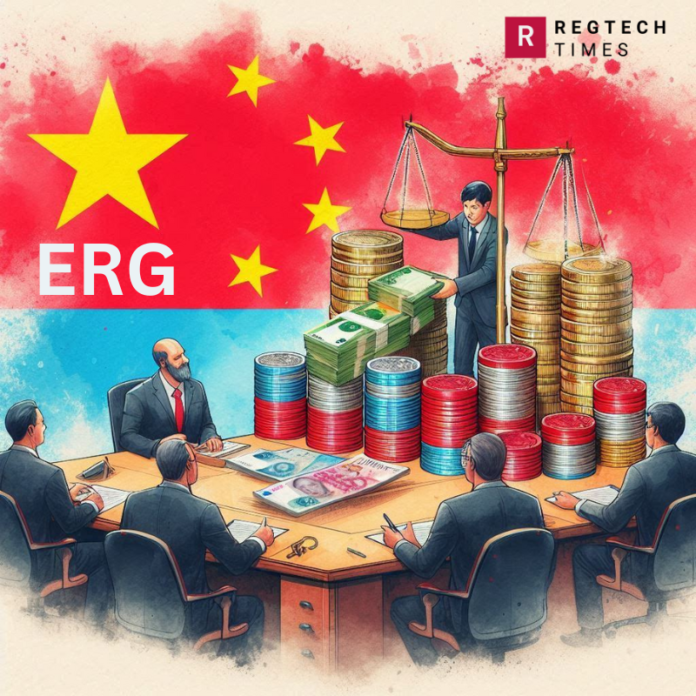A Luxembourg-based mining company, Eurasian Resources Group (ERG), found itself in a tough spot due to sanctions placed on Russia after it invaded Ukraine two years ago. These sanctions made it hard for ERG to repay its loans to Russia’s two biggest banks. To solve this, ERG had to repay part of its debt in Chinese yuan instead of dollars, which are easier to trade worldwide. ERG restructured its loan with VTB Bank so that $2 billion out of at least $3 billion in borrowings could be paid in yuan.
Growing Dependence on China
Since the start of the war, Russia has increasingly depended on China and the yuan for its economic activities. In Russia, loans in yuan tripled in value over 2023 as debts previously in dollars and euros were converted to the Chinese currency. Russian companies renegotiated their loans with local banks to avoid using Western currencies. However, it’s rare for companies like ERG outside Russia to make such a move.
ERG is partly owned by the Kazakh government and three tycoons. The pressure to restructure its repayment increased after the US announced it would broaden the scope of financial transactions and institutions it would sanction if they helped sustain Russia’s war efforts. In June, the US Treasury Department declared it would impose secondary sanctions on those involved with VTB Bank, Sberbank, and others. A Kazakh company that allegedly shipped advanced semiconductor equipment to Russia was also sanctioned.
Russia’s Adoption of Chinese Yuan Curtailed Amidst Secondary US Sanctions Fears
Default Risk and Financial Struggles
After Russia invaded Ukraine in February 2022, ERG faced the risk of defaulting on its loans to VTB Bank and Sberbank due to EU sanctions that prevented money transfers to these banks. Both banks were also sanctioned by the UK, Japan, Australia, and the US. To cope, VTB Bank and Sberbank allowed Eeurasian Resources Group to defer payments and pay reduced interest. Despite these measures, ERG and its auditor, PwC Luxembourg, expressed doubts about the company’s ability to continue operations.
ERG restructured its credit agreements with Sberbank last year, enabling it to make payments from 2024 onwards in compliance with applicable laws and regulations. This involved swapping the currency of part of its debt. The company did not disclose the new currency or the amount of its overall $7.4 billion corporate debt owed to Sberbank. However, ERG did pay Sberbank $283 million in early termination costs.
US Sanctions Intensify Russian Payment Issues with Its Allies China, Turkey and India
Mining Operations and Financial Performance
ERG has a small team of about two dozen people at its headquarters in Luxembourg. The company operates mines and production plants in Kazakhstan, producing products used in stainless steel, iron ore, and an essential input for aluminum. Its mines in the Democratic Republic of the Congo (DRC) and Zambia produce copper and cobalt, vital elements for lithium-ion batteries used in electric cars, computers, and mobile phones.
After the invasion, Eurasian Resources Group stopped iron ore sales to some of its largest Russian customers. Instead, it redirected these sales to China. ERG’s profits fell significantly last year, booking $133.7 million compared to $270.5 million in 2022. Revenues also dropped by 18% from $7.9 million in 2022 to $6.5 million due to price declines in cobalt and other products. ERG’s total debt increased by nearly $440 million last year, contributing to a negative outlook from credit rating agency Moody’s.
Cargo Ship at Arctic LNG 2 Terminal: A Bold Move in Russia’s Sanctions-Evasion Playbook
History of ERG and Legal Challenges
ERG has been based in Luxembourg since 2013, after moving from London. The company’s predecessor, Eurasian Natural Resources Corporation (ENRC), relocated due to an investigation by the UK’s Serious Fraud Office (SFO) into allegations of bribery in the DRC. Three major accounting firms declined to work with ERG in 2021 due to damaging news reports about the company. Last year, the SFO dropped the investigation, citing insufficient evidence.
In December, a judge ruled that the SFO might owe Eurasian Resources Group damages for launching its investigation based on illegitimate information leaked by a lawyer hired by ENRC. A trial to determine if the SFO and two investigators leaked sensitive information about ENRC is expected to start in October.
Uncertain Future and Global Connections
Eurasian Resources Group was founded in the early 1990s after the Soviet Union collapsed, allowing well-connected individuals to acquire valuable state assets. The company has faced leadership changes recently, with its founders stepping down in favor of their sons. ERG’s operations in the DRC, the world’s largest source of cobalt and Africa’s biggest producer of copper, are uncertain. The country’s state mining company has pressured ERG to sell its copper and cobalt assets.
Unraveling Russia’s Impact on Ukraine: Economic Resilience Amidst Sanctions and Military Endeavors
Additionally, the US White House is working to reduce non-Chinese mining control in Congo from an Israeli billionaire in business with ERG. This billionaire amassed influence in Congo’s mining sector since the late 1990s and partnered with ENRC (now ERG). The US imposed sanctions on him in 2017, claiming corrupt deals involving his companies cost Congo over $1.36 billion in revenues between 2010 and 2012. He has denied all allegations of corruption.
This year, the US administration has been negotiating a deal for him to sell his royalty rights in projects by ERG and Switzerland’s Glencore back to the Congolese government. The complex interplay of sanctions, international finance, and global mining operations continues to impact ERG’s activities and financial stability.


